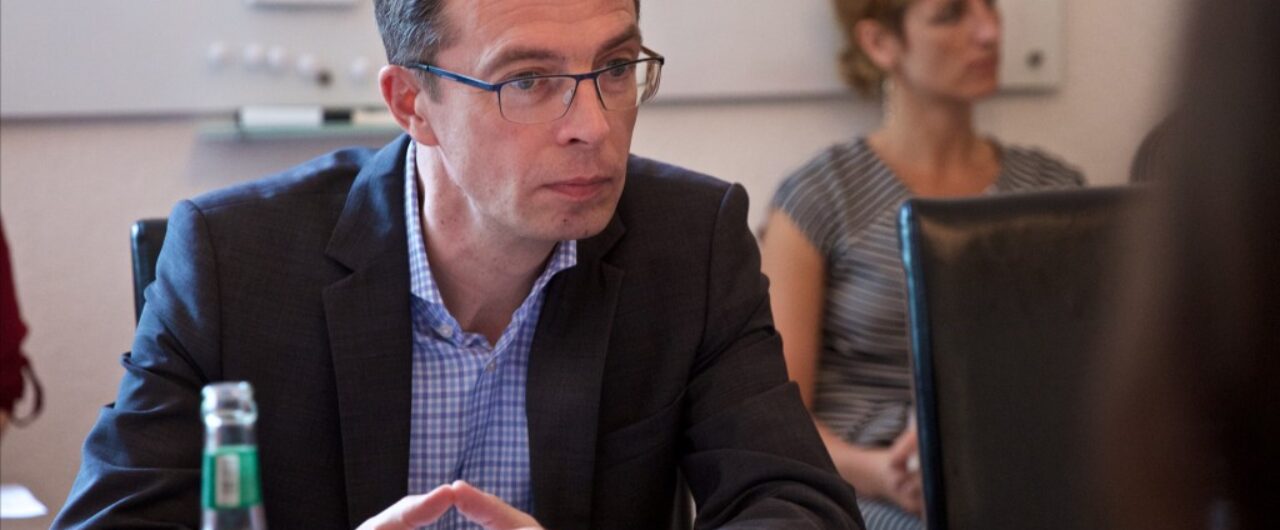Paul Nolte argues that the United States and Europe are, for the first time in a long while, witnessing a strikingly similar political phenomenon of grave importance, namely populism as the „movement of the disaffected“. His analysis was presented at the roundtable „US 2016 Presidential Elections: Insights from the Campaign and Consequences for Europe“, which was jointly organised by the Foundation for European Progressive Studies (FEPS) and Das Progressive Zentrum, and which took place on Friday, July 1, 2016.
I have been asked to contribute to this panel with a few thoughts on the “populist danger” in the U.S. and Europe, and I’ll do so in the next 10-12 minutes with an attempt at grasping the transatlantic phenomenon of “Populism” – certainly in the light of the U.S. presidential elections, and especially the “strange career of Donald Trump”, but also with an eye to the recent rise of populism in Germany, with the stunning election results for the AfD in three state elections earlier this year – and, not least, under the impression of last week’s “Brexit” vote in favor of leaving the European Union in the UK.
Looking back on the past decades, or almost: the past half century, of American and European political cultures, it is quite a bit stunning that a broad and aggressive populist challenge would affect the two sides of the Atlantic West in comparable ways. Certainly from the 1980s, and in a deeper sense since the re-invention of conservatism in the U.S. in the 1960s, the pathways of party systems and political ideologies in many respects developed in different directions. In the U.S., the New Deal consensus broke down, and the significant ideological and cultural overlap between the two major parties began to disappear. Republicans moved to the right, and Democrats somewhat to the left, or more precisely: The bandwidth on which both parties (and “camps” in political society) existed and acted significantly shrank, and polarization emerged.
In Western Europe however, ideological tensions relaxed, if not in the 1970s, then certainly in the 1980s, with the gradual retreat of the “cultural wars” about the 1960s protests, and more generally with political ideologies that had shaped European societies since the 19th century fading away in a post-ideological age. Germany is a prime example for this: Where have its true conservatives gone? The CDU has moved into the center, as has the SPD since the 1990s and under the Schröder government, creating significant overlap instead of eradicating it. – Other cultural trends underscored the same diagnosis of American and European estrangement, e.g, the fervent religious impulses in American (conservative) culture, with a “Third Great Awakening” that often left Europeans baffled in the light of their own secularization.
Now, quite suddenly with the rise of Trumpist populism in the United States over the past twelve months, American and European political cultures seem to share essential features again. The place of populism in the political system, especially in the party system, is quite obviously a different one. While right-wing populist parties in Europe have emerged as new projects, and have at least partially claimed the ideological “free space” that conservative or Christian Democratic parties have vacated in their own centrist liberalization, the amazing stability of the American two-party-system has produced populism within the major parties. Populist politicians from outside the party, or at least, the party’s mainstream, have been able to claim important parts of the party’s grassroots constituency, and “hijacked” the established party, or, in other words, made parasitic use of it. Of course, this description fits the complicated relationship of Donald Trump with the Republican Party best, but significantly, it also appears (if to a lesser degree, and far and away with less dangerous consequences) for Bernie Sanders’ left-wing populism, and his relationship with the Democratic Party.
The major axes of political culture have shifted both in America and in Europe. In this shift, they have converged into a new pattern of commonalities. In the old coordinates of “left vs. right”, political polarization in the U.S. stood in contrast to the centrist political cultures of Europe, and while these have increasingly been challenged from the right, as with the Front National in France, those right-wing populist challenges, interpreted more in the European tradition of rightist extremism (and in the last instance, in the continuity of fascism), European “rightism” still looked very different from American “rightism” as represented in the conservative turn of the Republican Party, in the evangelical movement and its social conservatism, or in the “Tea Party”.
In the age of populism, a new axis has become dominant, with new opposites between establishment and outsiders, optimists and pessimists, loyalists and disaffected. The new populism, despite some leftist variations, is undoubtledly a phenomenon mostly, and often very clearly, situated on the (extreme) political right. However, it often stands in vigorous conflicts with classical conservatism, especially in the case of Donald Trump, and across the U.S. and Europe may be better characterized as a movement of the disaffected, a movement of mistrust against elites and the establishment, and a movement of people who feel overwhelmed with a rapidly changing world; overwhelmed and anxious to the point of aggressiveness with the loosening of what they consider necessary strings of order that would hold society – national societies, that is – together.
Ironically, therefore, we might rejoice: Finally, America and Europe are no longer “oceans apart”, and there is much new fodder for transatlantic communication in the sense of talking about shared experiences and common challenges. Europeans have yet to realize that Trumpism is a cousin of what they have witnessed in populist, extremist, and anti-establishment parties for 2-3 decades; and Americans, it seems to me, even more have to realize that their own society has bred a political and cultural movement that many of them thought was possible only in Europe.
The populist challenge marks a deep crisis, and a shared crisis, for the U.S. and Europe. The American public, in particular, should be more aware of the dimension, and indeed, of the monstrosity of the challenge that Donald Trump’s rise and presidential candidacy presents. A new fascism is hardly imminent, neither in the U.S. nor in any European country. But in my opinion, there is a crisis of democracy that is very well comparable to the Great Crisis of democracy that America and Europe witnessed in the 1920s and early 1930s. Different from many other people, I do not consider this to be a crisis of institutions in the first place. Yes, there are grave problems with the (dis-) functionality of the political system, especially with Congress and the Presidency in the United States; and everyone could easily wish for a better institutional, and more democratic, arrangement of EU institutions. But basically, institutions work quite well (different from the 1920s in Europe!), and they often safeguard democracy against the populist challenge.
The Brexit vote, therefore, does not primarily point to weaknesses of the EU that British voters were smart enough to point at. Much rather, it signals a dramatic lack of legitimacy for complex institutions beyond the national state, a lack of understanding for the necessary complexity of multi-layered institutions in the 21st century; and most of all, a product of ruthless seduction by populist politicians with false claims of returning to more simple worlds of order. As it has just turned out, Boris Johnson is unfit for democratic leadership, as utterly unfit as Donald Trump is. Liberal Democrats and Progressives, therefore, should move out of their defensive, and indeed self-incriminatory posture. Populism does very little to help us realize weaknesses in democratic political systems, or inequities in society. Democratic politicians, public intellectuals and activists have to shift gear and confront populism, including the voters for populist parties, including the rank-and-file, and not just the leader-seducers, as what it is: A political and cultural cul-de-sac at best, and at its core a dangerous misunderstanding of modernity.
Because what American and European populism alike represents runs much deeper than a crisis of democracy, of political parties or the legitimacy of institutions. Much rather, populism is the epiphenomenon for a crisis of modernity—perhaps one might say, with the late Ulrich Beck, a crisis of “second modernity”, or a crisis in understanding the Western world and its liberal orders as they have come to be. Populists promise a restoration of a classical, well-ordered world, a world of center and periphery, a world of hierarchy and order, a world of clear-cut distinctions. Therefore, the recourse to one’s own nation, and a framework of national politics undisturbed by transnational entanglements and obligations takes center stage: be it in Trump’s “Make America Great Again”, in the anti-EU thrust of the Brexit movement, or in the German AfD’s nationalism and anti-solidarity affects, e.g., towards Southern Europe. The utopian society of populists everywhere is a stable society of indigenous citizens, not disturbed by globalization, by mobility and migration. It is also, to an astonishing degree, a society of male patriarchy and of a clear gender order in more general terms. Donald Trump’s misogyny is not accidental, or ephemeral. It must be understood as a symbolic code for protesting a liberal order in which women are equal to men, and practice their equality in a self-assertive way; and still broader: as a code for a general resentment to modernity.
Some of these anxieties are grounded in economic disruption. But this is far from the general pattern, and as is often the case, closer analysis would much rather point to “relative deprivation” than to economic exclusion or poverty. The populist challenge may not primarily be overcome by means of economic or social policy. And we certainly cannot, as Donald Trump and the like of him want to make believe, return the jobs of a Fordist, white-male dominated economy that has passed away already a generation ago. Some of the anxieties about modernity that populists express must be taken seriously. Because indeed, our worlds have been changing rapidly, in larger economic terms as well as in the definition of our social fabric: e.g., in the making of a multicultural society with an open gender order. Liberals and Leftists who see themselves on the avant-garde of those movements should allow others some time to adapt and understand. But ultimately, there is no question where we are heading, and what side will have to change their mindset and worldview. Only on this path will the populist danger eventually be overcome, as well as the other fundamentalist threat to a “Western liberal order 2.0” with which we are coping for decades now.
A roundtable summary can be found here. The roundtable programme is available here.





